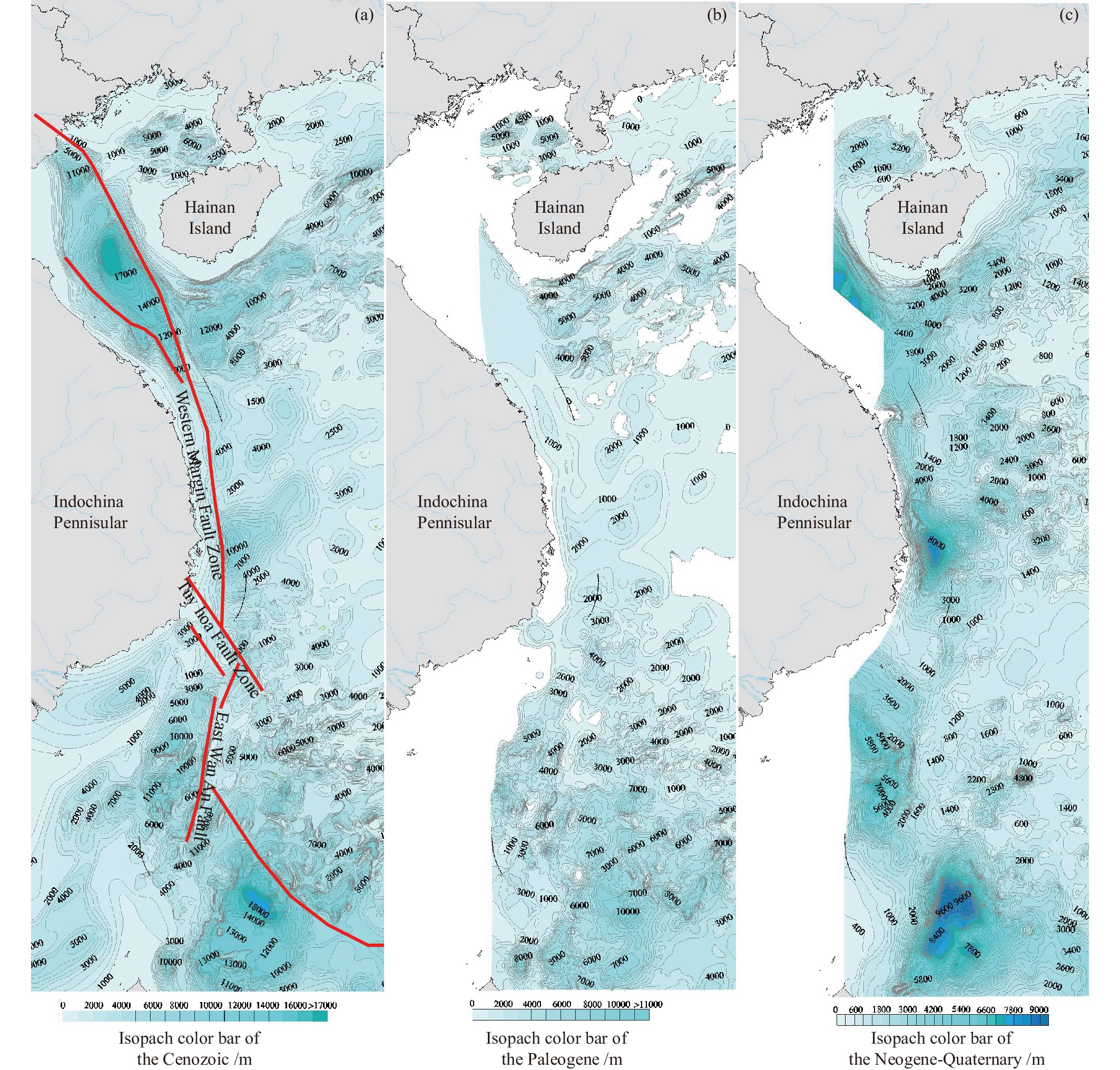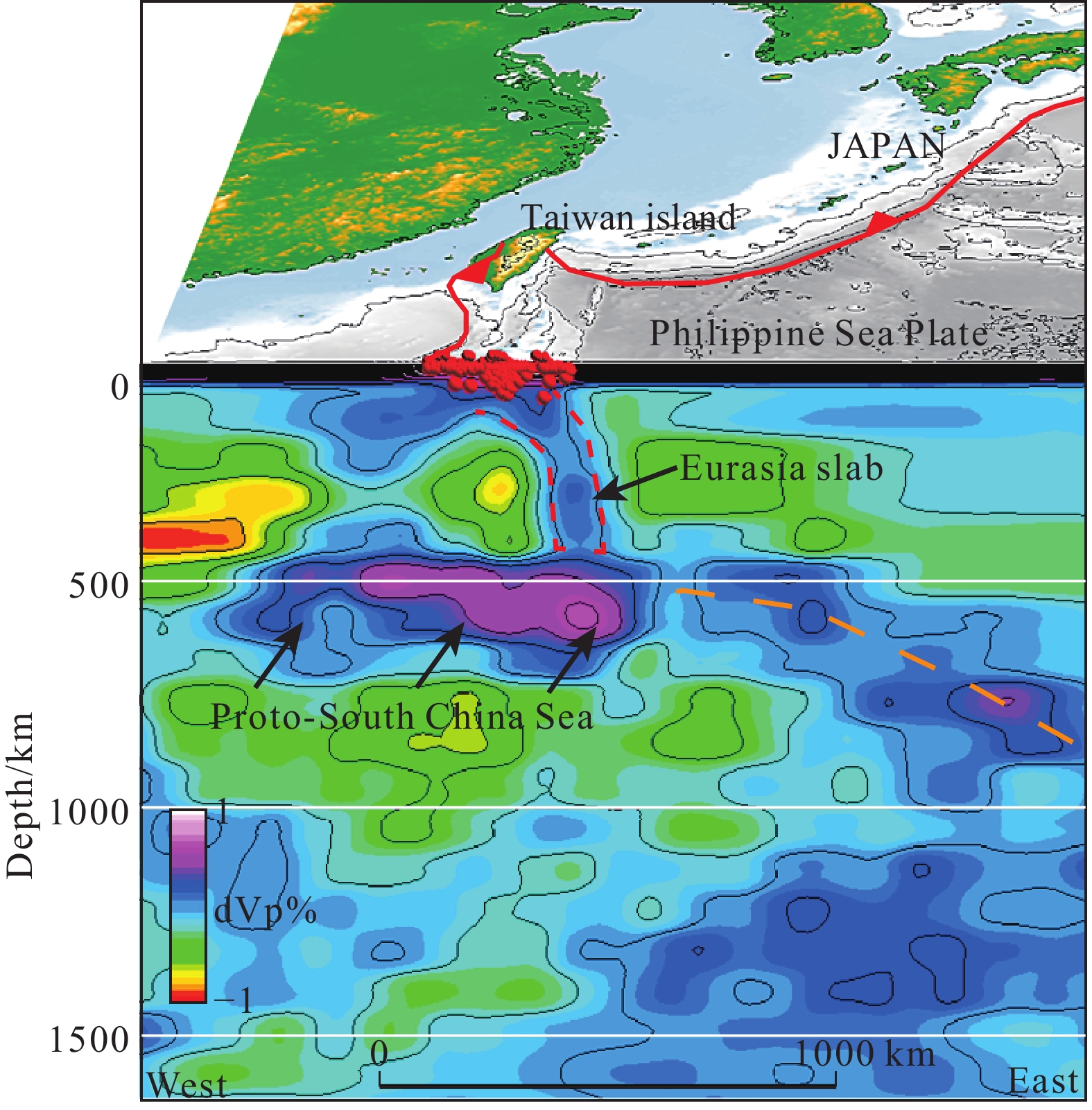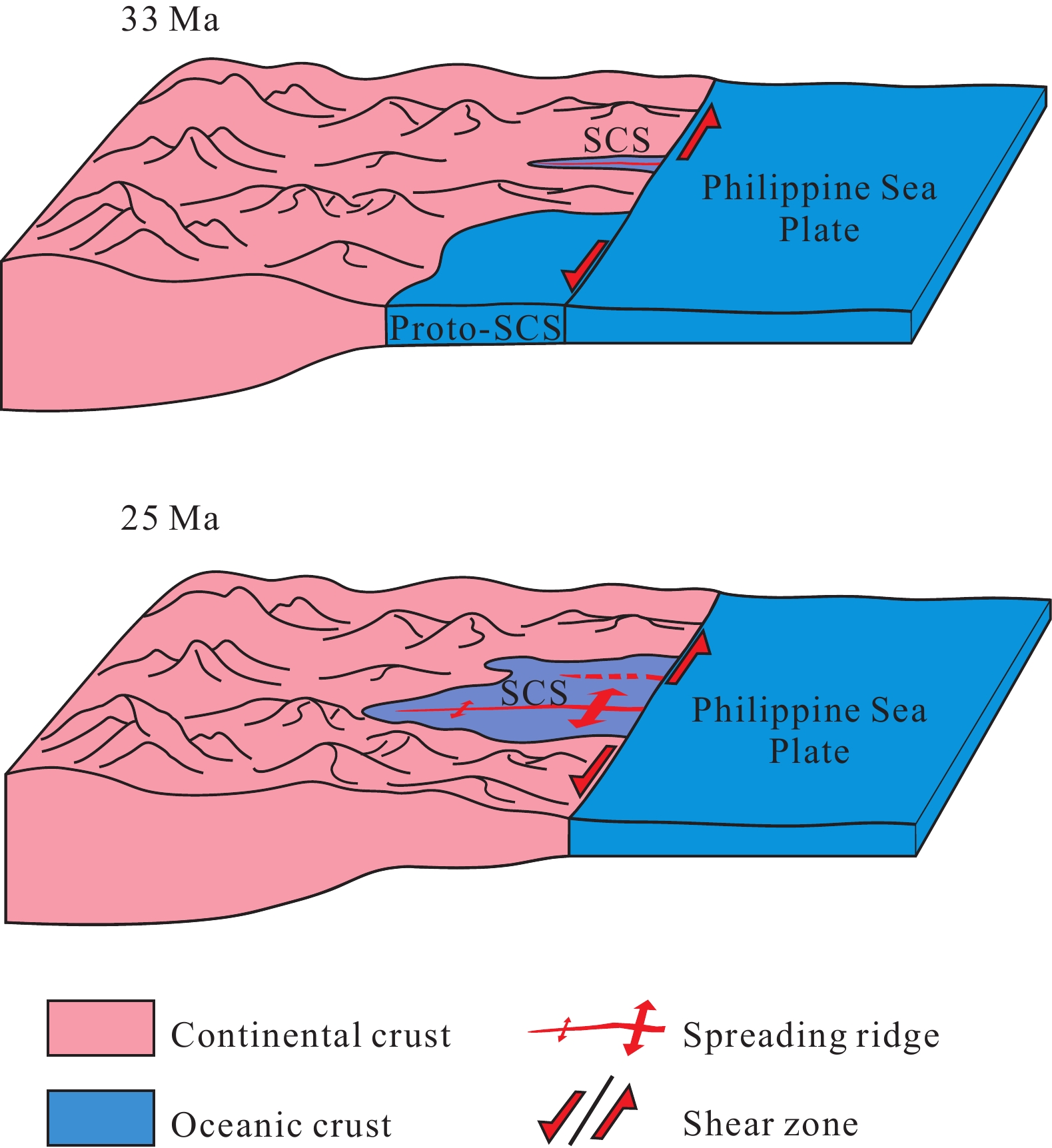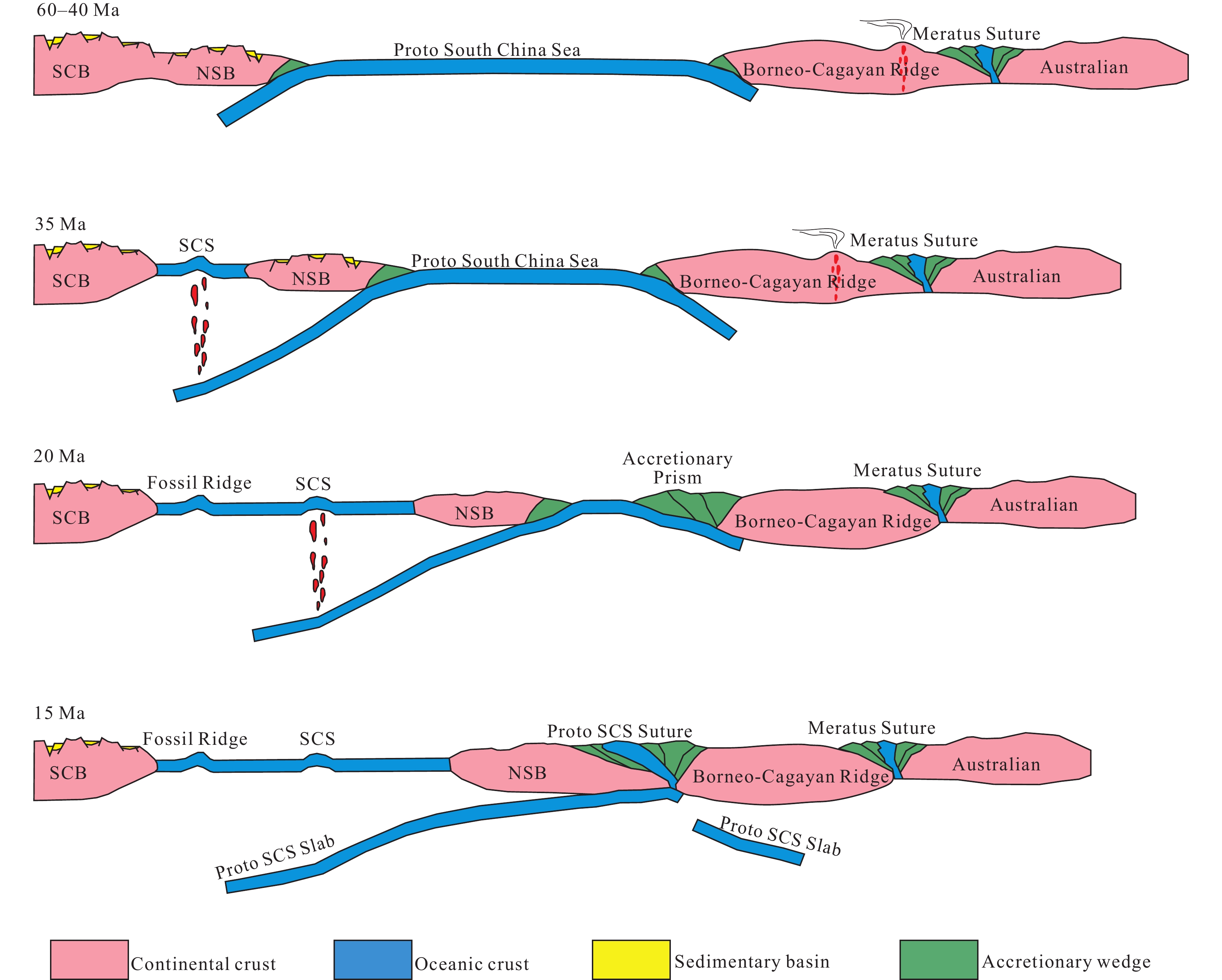| Citation: | Xue-jie Li, Zhe Wang, Yong-jian Yao, Hong-fang Gao, Song Zhu, Zi-ying Xu, 2023. Formation and evolution of the South China Sea since the Late Mesozoic: A review, China Geology, 6, 154-167. doi: 10.31035/cg2022021 |
Formation and evolution of the South China Sea since the Late Mesozoic: A review
-
Abstract
The existing genetic models of the South China Sea (SCS) include an extrusion model of the Indochina Peninsula, a back-arc extension model, and a subduction and dragging model of the Proto-South China Sea (PSCS). However, none of these models has been universally accepted because they do not fully match a large number of geological phenomena and facts. By examining the regional tectonics and integrating them with measured data for the SCS, in this study, a back-arc spreading-sinistral shear model is proposed. It is suggested that the SCS is a back-arc basin formed by northward subduction of the PSCS and its formation was triggered by left-lateral strike-slip motion due to the northward drift of the Philippine Sea Plate. The left-lateral strike-slip fault on the western margin caused by the Indo-Eurasian collision changed the direction of the Southwest Sub-basin’s spreading axis from nearly E–W to NE–SW, and subduction retreat caused the spreading ridge to jump southward. This study summarizes the evolution of the SCS and adjacent regions since the Late Mesozoic.
-

-
References
Aurelio MA, Peña RE, Taguibao KJL. 2012. Sculpting the Philippine archipelago since the cretaceous through rifting, oceanic spreading, subduction, obduction, collision and strike-slip faulting: Contribution to IGMA5000. Journal of Asian Earth Sciences, 72, 102–107. doi: 10.1016/j.jseaes.2012.10.007. Aurelio MA, Forbes MT, Taguibao KJL, Savella RB, Bacud JA, Franke D, Pubellier M, Savva D, Meresse F, Steuer S, Carranza CD. 2014. Middle to Late Cenozoic tectonic events in south and central Palawan (Philippines) and their implications to the evolution of the southeastern margin of South China Sea: Evidence from onshore structural and offshore seismic data. Marine and Petroleum Geology, 58, 658–673. doi: 10.1016/j.marpetgeo.2013.12.002. Ben-Avraham Z, Uyeda S. 1973. The evolution of the China basin and the Mesozoic paleogeography of Borneo. Earth and Planetary Science Letters, 18(2), 365–376. doi: 10.1016/0012-821X(73)90077-0. Briais A, Patriat P, Tapponnier P. 1993. Updated interpretation of magnetic-anomalies and sea-floor spreading stages in the South China Sea—implications for the tertiary tectonics of southeast-Asia. Journal of Geophysical Research, 98(B4), 6299–6328. doi: 10.1029/92jb02280. Cai ZR, Zhang Y, Liu WL, Wan ZF, Liu P. 2008. Relationship between the formation and evolution of the South China Sea and reactivation of the Neo-Tethys. Sedimentary Geology and Tethyan Geology, 28(3), 21–24 (in Chinese with English abstract). doi: 10.3969/j.issn.1009-3850.2008.03.004. Clift PD, Lee GH, Duc NA, Barckhausen U, Long HV, Sun Z. 2008. Seismic reflection evidence for a dangerous grounds miniplate: No extrusion origin for the South China Sea. Tectonics, 27(3), 1–16. doi: 10.1029/2007TC002216. Cullen A. 2014. Nature and significance of the West Baram and Tinjar Lines, NW Borneo. Marine and Petroleum Geology, 51, 197–209. doi: 10.1016/j.marpetgeo.2014.01.009. Deng JF, Zhao HL, Wu ZX, Lai SC, Luo ZH, Mo XX. 1992. A mantle plume beneath the north part of china continent and lithosphere motion. Geoscience, 6(3), 267–274 (in Chinese with English abstract). Deschamps A, Lallemand S. 2002. The West Philippine Basin: An Eocene to early Oligocene back arc basin opened between two opposed subduction zones. Journal of Geophysical Research, 107(B12), 2322. doi: 10.1029/2001JB001706. Encarnación J. 2004. Multiple ophiolite generation preserved in the northern Philippines and the growth of an island arc complex. Tectonophysics, 392(1), 103–130. doi: 10.1016/j.tecto.2004.04.010. Fyhn MBW, Boldreel LO, Nielsen LH. 2009. Geological development of the Central and South Vietnamese margin: Implications for the establishment of the South China Sea, Indochinese escape tectonics and Cenozoic volcanism. Tectonophysics, 478(3), 184–214. doi: 10.1016/j.tecto.2009.08.002. Galin T, Breitfeld HT, Hall R, Sevastjanova I. 2017. Provenance of the Cretaceous-Eocene Rajang Group submarine fan, Sarawak, Malaysia from light and heavy mineral assemblages and U-Pb zircon geochronology. Gondwana Research, 51, 209–233. doi: 10.1016/j.gr.2017.07.016. Guo LZ, Shi YS, Ma RS. 1983. On the formation and evolution of the Mesozoic-Cenozoic active continental margin and island arc tectonics of the western Pacific Ocean. Acta Geologica Sinica, 57(1), 11–21 (in Chinese with English abstract). Hall R. 2002. Cenozoic geological and plate tectonic evolution of SE Asia and the SW Pacific: Computer-based reconstructions, model and animations. Journal of Asian Earth Sciences, 20(4), 353–431. doi: 10.1016/s1367-9120(01)00069-4. Hall R, Ali JR, Anderson CD. 1995. Cenozoic motion of the Philippine Sea plate: Paleomagnetic evidence from eastern Indonesia. Tectonics, 14(5), 1117–1132. doi: 10.1029/95TC01694. Hall R. 1996. Reconstructing Cenozoic SE Asia. In: Hall R, Blundell DJ (Eds. ), Tectonic Evolution of SE Asia. Geological Society London Special Publication, 106 (1), 153–184. doi: 10.1144/GSL.SP.1996.106.01.11. Hall R, Van Hattum MWA, Spakman W. 2008. Impact of India-Asia collision on SE Asia: The record in Borneo. Tectonophysics, 451(1), 366–389. doi: 10.1016/j.tecto.2007.11.058. Hall R. 2012. Late Jurassic-Cenozoic reconstructions of the Indonesian region and the Indian Ocean. Tectonophysics, 570, 1–41. doi: 10.1016/j.tecto.2012.04.021. Hall R. 2013. Contraction and extension in northern Borneo driven by subduction rollback. Journal of Asian Earth Sciences, 76, 399–411. doi: 10.1016/j.jseaes.2013.04.010. Hilde TWC, Uyeda S, Kroenke L. 1977. Evolution of the western Pacific and its margin. Tectonophysics, 38, 145–165. doi: 10.1016/0040-1951(77)90205-0. Hilde TWC, Lee CS. 1984. Origin and evolution of the West Philippine Basin: A new interpretation. Tectonophysics, 102(1), 85–104. doi: 10.1016/0040-1951(84)90009-X. Holloway NH. 1982. North Palawan Block, Philippines—its relation to Asian Mainland and role in evolution of South China Sea. AAPG Bulletin, 66(9), 1355–1383. doi: 10.1306/03B5A7A5-16D1-11D7-8645000102C1865D. Hong WT, Yu MG, Yang ZL, Xing GF. 2020. Cenozoic tectonic units and their stratigraphic characteristics of southern west Pacific region: Implication for Himalayan orogeny. Geological Bulletin of China, 39 (6), 839–860 (in Chinese with English abstract). http://dzhtb.cgs.cn/html/2020/6/20200605.htm. Hutchison CS. 2010. Oroclines and paleomagnetism in Borneo and South-East Asia. Tectonophysics, 496(1), 53–67. doi: 10.1016/j.tecto.2010.10.008. Ishizuka O, Taylor RN, Ohara Y, Yuasa M. 2013. Upwelling, rifting, and age-progressive magmatism from the Oki-Daito mantle plume. Geology, 41(9), 1011–1014. doi: 10.1130/G34525.1. Lee TY, Lawver LA. 1995. Cenozoic plate reconstructions of the Southeast Asia. Tectonophysics, 251, 85–138. doi: 10.1016/0040-1951(95)00023-2. Li CF, Xu X, Lin J, Sun Z, Zhu J, Yao YJ, Zhao XX, Liu QS, Kulhanek DK, Wang J. 2014. Age and magnetic structures of the South China Sea constrained by deep tow magnetic surveys and IODP Expedition 349. Geochemistry, Geophysics, Geosystems, 15 (12), 4958–4983. doi: 10.1002/2014GC005567. Li CF, Li JB, Ding WW, Franke D. 2015. Seismic stratigraphy of the central South China Sea basin and implications for neotectonics. Journal of Geophysical Research, 120(3), 1377–1399. doi: 10.1002/2014JB011686. Li SZ, Suo YH, Liu X, Dai LM, Yu S, Zhao SJ, Ma Y, Wang XF, Cheng SX, Xue YC, Xiong LJ, An HT. 2012. Basic strcutural pattern and tectonic models of the south china sea: Problems, advances and controversies. Marine Geology and Quaternary Geology, 32(6), 35–53 (in Chinese with English abstract). doi: 10.3724/SP.J.1140.2012.06035. Li ST, Lin CS, Zhang QM, Yang SG, Wu PK. 1998. Dynamic process of episodic rifting in the northern continental margin basin of the South China Sea and tectonic events since 10 Ma. China Science Bulletin, 43(8), 797–810 (in Chinese with English abstract). doi: 10.1360/csb1998-43-8-797. Li XJ, Wang Z, Yao YJ, Gao HF, Li B. 2017. The tectonic features and evolution of the west Pacific margin. Geology in China, 44(6), 1102–1114 (in Chinese with English abstract). doi: 10.12029/gc20170605. Li XJ, Wang Z, Yao YJ, Gao HF, Zhu S, Xu ZY. 2020. The formation and evolution of the South China Sea. Geology in China, 47(5), 1310–1322 (in Chinese with English abstract). doi: 10.12029/gc20200502. Liang HY, Campbell IH, Allen CM, Sun WD, Yu HX, Xie YW, Zhang YQ. 2007. The age of the potassic alkaline igneous rocks along the Ailao Shan-Red River shear zone: Implications for the onset age of left-lateral shearing. The Journal of Geology, 115(2), 201–204. doi: 10.1086/510801. Lin CS, Yu XJ, He YH, Tan YH. 2006. Question on the spreading of the South China Sea Basin. Acta Oceanologica Sinica, 28(1), 67–76 (in Chinese with English abstract). doi: 10.3321/j.issn:0253-4193.2006.01.010. Liu WN, Li CF, Li JB, Fairhead D, Zhou ZY. 2014. Deep structures of the Palawan and Sulu Sea and their implications for opening of the South China Sea. Marine and Petroleum Geology, 58, 721–735. doi: 10.1016/j.marpetgeo.2014.06.005. Lu BL, Wang PJ, Liang JS, Sun XM, Wang WY. 2014. Structural properties of Paleo-South China Sea and their relationship with the Tethys and the Paleo-Pacific tectonic domain. Journal of Jilin University (Earth Science Edition), 44(5), 1441–1450 (in Chinese with English abstract). doi: 10.13278/j.cnki.jjuese.201405105. Luan XW, Zhang L. 2009. Tectonic evolution modes of South China Sea: Passive spreading under complex actions. Marine Geology and Quaternary Geology, 29(6), 59–74 (in Chinese with English abstract). doi: 10.3724/SP.J.1140.2009.06059. Madon M, Kim CL, Wong R. 2013. The structure and stratigraphy of deepwater Sarawak, Malaysia: Implications for tectonic evolution. Journal of Asian Earth Sciences, 76, 312–333. doi: 10.1016/j.jseaes.2013.04.040. McElhinny MW, Haile NS, Crawford AR. 1974. Paleomagnetic evidence shows Malay Peninsula was not a part of Gondwanaland. Nature, 252(5485), 641–645. doi: 10.1038/252641a0. Mine and Geosciences Bureau of Philippines (MGBP). 2010. Geologic and Tectonic Map of the Philippines (third edition). Morley CK. 2002. A tectonic model for the tertiary evolution of strike-slip faults and rift basins in SE Asia. Tectonophysics, 347(4), 189–215. doi: 10.1016/S0040-1951(02)00061-6. Pubellier M, Monnier C, Maury R, Tamayo R. 2004. Plate kinematics, origin and tectonic emplacement of supra-subduction ophiolites in SE Asia. Tectonophysics, 392(1), 9–36. doi: 10.1016/j.tecto.2004.04.028. Pubellier M, Meresse F. 2013. Phanerozoic growth of Asia: Geodynamic processes and evolution. Journal of Asian Earth Sciences, 72, 118–128. doi: 10.1016/j.jseaes.2012.06.013. Queano KL, Ali JR, Milsom J, Aitchison JC, Pubellier M. 2007. North Luzon and the Philippine Sea Plate motion model: Insights following paleomagnetic, structural, and age-dating investigations. Journal of Geophysical Research, 112, B05101. doi: 10.1029/2006JB004506. Rangin C, Bellon H, Benard F, Letouzey J, Muller C, Sanudin T. 1990. Neogene arc-continent collision in Sabah, Northern Borneo (Malaysia). Tectonophysics, 183, 305–319. doi: 10.1016/0040-1951(90)90423-6. Raschka H, Nacario E, Rammlmair D. 1985. Geology of the ophiolite of central Palawan Island, Philippines. Ofioliti, 10, 375–390. Ren JY, Li ST. 2000. Spreading and dynamic setting of marginal basins of the western pacific. Earth Science Frontiers, 7(3), 203–213 (in Chinese with English abstract). doi: 10.3321/j.issn:1005-2321.2000.03.019. Replumaz A, Tapponnier P. 2003. Reconstruction of the deformed collision zone between India and Asia by backward motion of lithospheric blocks. Journal of Geophysical Research, 108(B6), 2285. doi: 10.1029/2001JB000661. Sdrolias M, Roest WR, Müller RD. 2004. An expression of Philippine Sea plate rotation: The Parece Vela and Shikoku Basins. Tectonophysics, 394(1), 69–86. doi: 10.1016/j.tecto.2004.07.061. Searle MP. 2006. Role of the Red River shear zone, Yunnan and Vietnam, in the continental extrusion of SE Asia. Journal of the Geological Society of London, 163(6), 1025–1036. doi: 10.1144/0016-76492005-144. Shang LN, Zhang Y, Yao YJ, Wu H, Hu G, Tian ZX. 2020. Late Cenozoic evolution of East China continental margin and restoration of plate interaction processes. Geology in China, 47(5), 1323–1336 (in Chinese with English abstract). doi: 10.12029/gc20200503. Sun Z, Zhou D, Zhong ZH, Xia B, Qiu XL, Zeng ZX, Jiang JQ. 2006. Research on the dynamics of the South China Sea opening, evidence from analogue modeling. Science in China Series D: Earth Sciences, 49(10), 1053–1069. doi: 10.1007/s11430-006-1053-6. Sun WD. 2016. Initiation and evolution of the South China Sea: An overview. Acta Geochimica, 35(3), 215–225. doi: 10.1007/s11631-016-0113-7. Tapponnier P, Peltzer G, Dain AYL, Armijo R, Cobbold P. 1982. Propagating extrusion tectonics in Asia: New insights from simple experiments with plasticine. Geology, 10(12), 611–616. doi: 10.1130/0091-7613(1982)10<611:PETIAN>2.0.CO;2. Tapponnier P, Lacassin R, Leloup PH, Schärer U, Zhong DL, Wu HW, Liu XH, Ji SC, Zhang LS, Zhong JY. 1990. The Ailao Shan/Red River metamorphic belt: Tertiary left-lateral shear between Indochina and South China. Nature, 343(6257), 431–437. doi: 10.1038/343431a0. Taylor B, Hayes DE. 1982. Origin and history of the South China Sea Basin. In, Hayes DE. (Ed. ), The Tectonic and Geologic Evolution of Southeast Asian Seas and Islands, Part 2, 27, 23–56. Wakita K. 2000. Cretaceous accretionary–collision complexes in central Indonesia. Journal of Asian Earth Sciences, 18(6), 739–749. doi: 10.1016/s1367-9120(00)00020-1. Wang EQ. 2017. A discussion on the timing of the initial collision between the Indian and Asian continents. Scientia Sinica (Terrae), 47, 284–292 (in Chinese with English abstract). doi: 10.1360/N072016-00136. Wang LJ, Yao YJ, Sun Z, Li FC, Yang CP, Xu ZY. 2020. The discrimination of Mesozoic sequence and its tectonic attribute in the southeastern South China Sea. Geology in China, 47(5), 1337–1354 (in Chinese with English abstract). doi: 10.12029/gc20200504. Wang PC, Li SZ, Guo LL, Zhao SJ, Li XY, Wang YM, Hui GG, Wang Q. 2017. Opening of the South China Sea (SCS): A joint effect of dextral strike-slip pull-apart and proto-SCS slab pull. Earth Science Frontiers, 24(7), 294–319 (in Chinese with English abstract). doi: 10.13745/j.esf.yx.2017-4-3. Wang PC, Li SZ, Suo YH, Guo LL, Santosh M, Li XY, Wang GZ, Jiang ZX, Liu B, Zhou J, Jiang SH, Cao XZ, Liu Z. 2021. Structural and kinematic analysis of Cenozoic rift basins in South China Sea: A synthesis. Earth-Science Reviews, 216, 103522 . doi: 10.1016/j.earscirev.2021.103522. Watkinson I, Elders C, Hall R. 2008. The kinematic history of the Khlong Marui and Ranong Faults, southern Thailand. Journal of Structural Geology, 30, 1554–1571. doi: 10.1016/j.jsg.2008.09.001. Wu J, Suppe J, Lu R, Kanda RVS. 2016. Philippine Sea and East Asian plate tectonics since 52 Ma constrained by new subducted slab reconstruction methods. Journal of Geophysical Research, 121(6), 4670–4741. doi: 10.1002/2016JB012923. Wu J, Suppe J. 2018. Proto-South China Sea plate tectonics using subducted slab constraints from tomography. Journal of Earth Science, 29(6), 1304–1318. doi: 10.1007/s12583-017-0813-x. Xia B, Cui XJ, Xie JH, Wang R. 2004. Thinking about the dynamics mechanism study on formation and evolution of South China Sea. Geotectonica et metallogenia, 28(3), 221–227 (in Chinese with English abstract). doi: 10.1007/BF02873097. Xie JH, Xia B, Zhang YH, Wang XC. 2005. Study on formation and evolution of the South China Sea. Advances in Marine Science, 23(2), 212–218 (in Chinese with English abstract). doi: 10.3969/j.issn.1671-6647.2005.02.013. Xu JY, Zhang LY. 2000. Genesis of Cenozoic basins in northwest pacific margin(2): Linked dextral pull-apart basin system. Oil & Gas Geology, 21(3), 185–190 (in Chinese with English abstract). doi: 10.11743/ogg20000301. Xu YG, Wei JX, Qiu HN, Zhang HH. 2012. Opening and evolution of the South China Sea constrained by studies on volcanic rocks: Preliminary results and a research design. Chinese Science Bulletin, 57(24), 3150–3164. doi: 10.1007/s11434-011-4921-1. Yamazaki T, Seama N, Okino K, Kitada K, Joshima M, Oda H, Naka J. 2003. Spreading process of the northern Mariana Trough: Rifting-spreading transition at 22°N. Geochemistry Geophysics Geosystems, 4(9), 1075. doi: 10.1029/2002gc000492. Yamazaki T, Takahashi M, Iryu Y, Sato T, Oda M, Takayanagi H, Chiyonobu S, Nishimura A, Nakazawa T, Ooka T. 2010. Philippine Sea Plate motion since the Eocene estimated from paleomagnetism of seafloor drill cores and gravity cores. Earth, Planets and Space, 62 (6), 495–502. doi: 10.5047/eps.2010.04.001. Yan QS, Shi XF. 2007. Hainan mantle plume and the formation and evolution of the South China Sea. Geological Journal of China Universities, 13(2), 311–322 (in Chinese with English abstract). doi: 10.16108/j.issn1006-7493.2007.02.014. Yang MZ, Wu JM, Yang R, Duan WW. 1996. Stratigraphic division and nomenclature of the southwestern Nansha Sea area. Geological Research of South China Sea, 8, 37–47 (in Chinese with English abstract). Yao BC. 1997. The sea floor spreading in the SW subbasin of South China Sea and it’s tectonic significance. Geological Research of South China Sea, 9, 20–36 (in Chinese with English abstract). Yao BC, Wan L, Wu NY. 2004. Cenozoic plate tectonic activities in the Great South China Sea area. Geology in China, 31(2), 113–122 (in Chinese with English abstract). doi: 10.3969/j.issn.1000-3657.2004.02.001. Yuan XB, Fang NQ. 2019. The new volcanics record in Sanshui Basin and its relationship with the spreading of the South China Sea. Geological Bulletin of China, 38(4), 689–695 (in Chinese with English abstract). Yumul GP, Dimalanta CB, Maglambayan VB, Marquez EJ. 2008. Tectonic setting of a composite terrane: A review of the Philippine island arc system. Geosciences Journal, 12(1), 7–17. doi: 10.1007/s12303-008-0002-0. Zhang GC, Wang PJ, Wu JF, Liu SX, Xie XJ. 2015. Tectonic cycle of marginal oceanic basin: A new evolution model of the South China Sea. Earth Science Frontiers, 22(3), 27–37 (in Chinese with English abstract). doi: 10.13745/j.esf.2015.03.002. Zhao DP. 2007. Seismic images under 60 hotspots: Search for mantle plumes. Gondwana Research, 12(4), 335–355. doi: 10.1016/j.gr.2007.03.001. Zhou D. 2002. Mesozoic strata and sedimentary environment in SW Taiwan basin of NE South China Sea and Peikang high of western Taiwan. Journal of Tropical Oceanography, 21(2), 50–57 (in Chinese with English abstract). doi: 10.3969/j.issn.1009-5470.2002.02.006. -
Access History

-
Figure 1.
Map showing the main models of the genesis of the SCS (after Sun WD, 2016). a–Extrusion model; b–PSCS subduction-slab pull model; c–Hybrid model.
-
Figure 2.
Map showing the tectonic setting of the SCS and its adjacent areas.
-
Figure 3.
Western Margin Fault (WMF) of the SCS and sedimentary thickness. (a)–Cenozoic thickness; (b)–Paleogene thickness; (c)–Neocene-Quaternary thickness.
-
Figure 4.
Distribution of ophiolite and suture lines in southern SCS (Modified from MGBP, 2010; Aurelio MA et al., 2014; Galin T et al., 2017; Hutchison CS, 2010; Hall R, 2013; Pubellier M et al., 2004; Hall R et al., 2008; Lu BL et al., 2014).
-
Figure 5.
Distribution of the PSCS slabs (Modified from Wu J and Suppe J, 2018).
-
Figure 6.
Tomographic cross-section showing the PSCS slabs beneath the SCS (Modified from Wu J and Suppe J, 2018).
-
Figure 7.
Schematic diagram of the strike-slip boundary in the eastern SCS.
-
Figure 8.
Cross-sectional model showing the evolution of the SCS.
-
Figure 9.
Schematic map showing the evolution of the SCS and its surrounding areas (the regional tectonic evolution is based on Wu J et al., 2016).

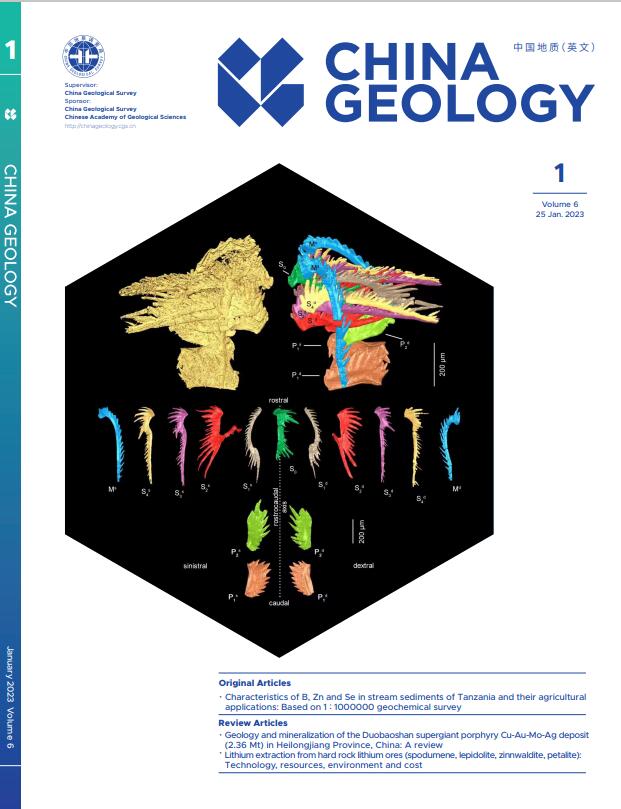



 DownLoad:
DownLoad:

